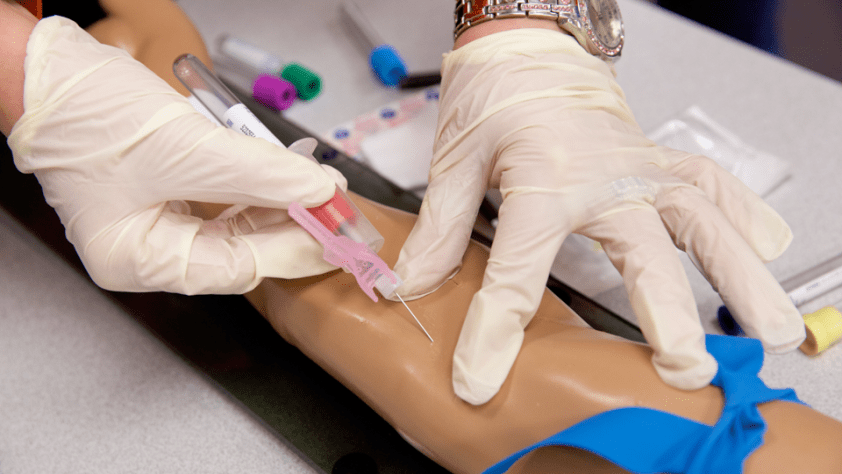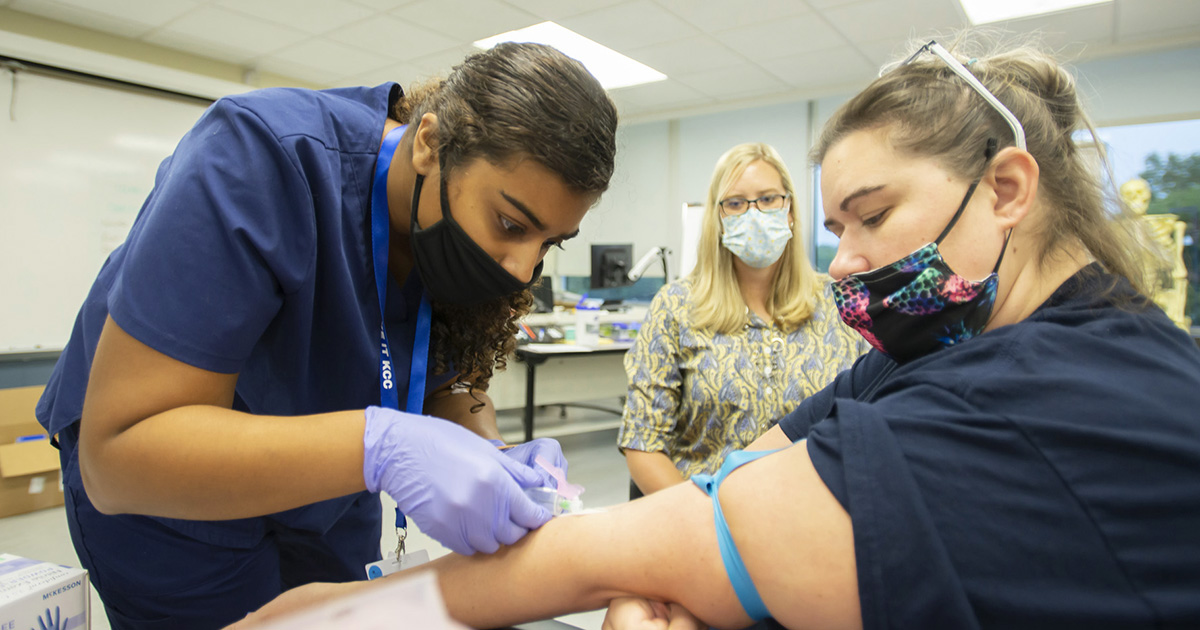The Path to Accreditation: Understanding the Phlebotomy Educating Program Trip and Its Significance
As you take into consideration the path to qualification in phlebotomy, it is very important to understand the duty you'll play in health care. Your training will certainly cover important abilities, from blood collection techniques to patient interaction. Each component of the program prepares you for the difficulties ahead. What precisely does the journey entail, and why is certification so important for your future occupation? Allow's explore these inquiries even more.

The Role of Phlebotomists in Health Care
Phlebotomists play an important function in the medical care system, functioning as the essential link between patients and necessary analysis testing. You'll perform blood attracts, making certain examples are collected accurately and securely. Your experience assists in detecting clinical conditions, monitoring health, and guiding treatment choices.
In your day-to-day communications, you'll require to establish depend on with individuals, making them feel comfy throughout what could be a stressful experience. You are in charge of identifying and handling examples carefully to protect against contamination or errors, which might impact examination results.
Past this, you'll commonly work along with physicians and nurses, communicating crucial details about clients' conditions. Your function is fundamental in keeping the operations in health care setups, making certain prompt and accurate results. By mastering your skills, you contribute meaningfully to person treatment, making you an indispensable component of the medical group. Welcoming this obligation is key to your success as a phlebotomist.
Summary of Phlebotomy Training Programs
When exploring phlebotomy training programs, you'll locate various types developed to fit different schedules and learning styles. Each program helps you create vital skills like blood collection and individual communication. Comprehending these options is key to choosing the ideal course for your occupation.
Sorts Of Training Programs
A number of kinds of training programs are offered for those wanting to end up being proficient in phlebotomy. You can pick from certification programs, which generally last a few months and concentrate on essential skills. There are also diploma programs that supply a more extensive education, often lasting as much as a year. If you're searching for a much deeper understanding, an associate degree in an associated area may be the best fit. On the internet courses supply adaptability for those stabilizing work or family members commitments, permitting you to examine at your own pace. In addition, some healthcare facilities and clinics offer on-the-job training programs, offering practical experience while you discover. Whatever course you pick, each program aims to furnish you with the needed skills for an effective phlebotomy career.

Key Skills Created
Mastering phlebotomy requires a collection of key skills that are established through extensive training programs. In addition, communication abilities are fundamental; you'll need to connect with individuals, describe treatments, and placed them at simplicity. Each of these skills is crucial for your success as a certified phlebotomist, making you a useful asset in any type of health care setting.
Trick Components of a Phlebotomy Program
In a phlebotomy program, you'll focus on essential topics that lay the groundwork for your future profession. You'll participate in hands-on training that allows you to apply what you have actually discovered in real-world setups. Both the core educational program and useful experience are essential for your success as a phlebotomist.
Curriculum Summary
While seeking a phlebotomy training program, you'll run into a curriculum created to equip you with basic skills and expertise. Phlebotomy Courses Near Me. This educational program normally includes composition and physiology, focusing on the blood circulation system and comprehending blood components. You'll additionally learn more about different sorts of blood collection approaches, consisting of venipuncture and capillary slit methods
In addition, infection control and safety methods are crucial parts, ensuring you know just how to preserve a sterile setting. You'll research patient interaction, stressing communication and compassion, which are critical for relieving patient stress and anxiety.
Hands-On Training Experience
Obtaining hands-on experience is a vital component of your phlebotomy training course. This sensible training permits you to use what you have actually discovered in a real-world setting, improving your skills and confidence. You'll exercise venipuncture techniques, learn exactly how to manage various sorts of samplings, and get acquainted with the tools made use of in the area. Under the advice of knowledgeable instructors, you'll improve your skills, ensuring you're planned for any type of scenario you might encounter.
Furthermore, you'll obtain the chance to communicate with people, which is crucial for creating your communication abilities. This mix of technical effectiveness and social abilities is essential for your success as a certified phlebotomist. Inevitably, hands-on training is where theory satisfies technique, solidifying your knowledge and readiness for accreditation.
Certification and Licensing Demands
Before you can begin your job in phlebotomy, it is crucial to understand the certification and licensing demands that vary by state. A lot of states need phlebotomists to hold a certification from an acknowledged company, such as the National Phlebotomy Organization or the American Culture for Clinical Pathology. These qualifications generally include passing a test that tests your expertise and abilities in the field.
Along with certification, some states have specific licensing requirements. You may require to complete a particular variety of hours in scientific practice, send proof of training, or undergo a history check. It is essential to investigate your state's policies to see to it you satisfy all essential standards.
Remaining educated concerning these requirements not just helps you protect a placement but also boosts your integrity as a specialist. By satisfying these needs, you'll be well on your means to an effective occupation in phlebotomy.
Hands-On Training and Practical Experience
Hands-on training and sensible experience are essential parts of your phlebotomy education, as they allow you to apply academic understanding in real-world circumstances. During your training, you'll involve in monitored venipuncture, discover proper techniques, and come to be knowledgeable about numerous blood collection devices. This straight participation is vital for developing your self-confidence and developing your abilities.
You'll function carefully with skilled professionals who can direct you through the subtleties of patient communication and example handling. Each session not just strengthens your understanding but additionally prepares you for the busy setting of healthcare setups.
Furthermore, lots of programs include medical turnings, allowing you to experience varied settings, from medical facilities to outpatient facilities. This direct exposure helps you adjust to various difficulties and person needs, guaranteeing you're well-prepared for your future role. Accept these chances, as they're necessary to coming to be a qualified and caring phlebotomist.
Difficulties Dealt With During Training
While obtaining hands-on experience is important, it's important to identify the challenges that can develop during your phlebotomy training. You might run into anxiousness when executing procedures on genuine individuals, especially if you're new to the setting. The pressure to obtain everything right can be overwhelming. Furthermore, understanding the skills needed for blood attracts takes practice; you may deal with technique at first.
Time administration can likewise be a hurdle, as balancing concept, sensible sessions, and personal dedications can feel intimidating. You may deal with varying finding out speeds among your peers, resulting in sensations of insecurity if you assume you're falling back. Adjusting to the different individualities of trainers can be challenging, as each may have an unique mentor design.
Recognizing these barriers early can prepare you for success and aid Phlebotomy Classes Near Me you establish strength throughout your training trip.
Profession Opportunities After Certification

As you get experience, you could even think about concentrating on areas like pediatric or geriatric phlebotomy, satisfying details person requirements. Some phlebotomists pick to progress their careers by coming to be research laboratory technicians or seeking more education and learning in health care areas.
Furthermore, your qualification can bring about roles in training or supervising new phlebotomists, allowing you to share your understanding. With the healthcare industry consistently growing, your skills will certainly constantly remain in demand, leading the way for a steady and fulfilling job. Accept the opportunities awaiting you!
Regularly Asked Inquiries
What Is the Common Duration of a Phlebotomy Educating Program?
Phlebotomy training courses commonly last around four to 8 weeks. You'll take part in hands-on method, classroom guideline, and online understanding. Completing this training prepares you for accreditation and a fulfilling occupation in health care.
Are Online Phlebotomy Courses Available?
Yes, on-line phlebotomy training courses are available. They offer flexibility and benefit, enabling you to study at your own pace. Simply confirm the program is approved to satisfy certification demands and gain important abilities for your job.
Just How Much Does Phlebotomy Training Generally Cost?
Phlebotomy training normally sets you back in between $700 and $2,500, relying on the program and area. You ought to think about elements like course length, consisted of products, and hands-on experience when choosing the right training for you.
What Are Common Requirements for Phlebotomy Training?
Common prerequisites for phlebotomy training typically consist of a secondary school diploma or GED, booster shots, and a history check. Some programs might likewise call for fundamental health care understanding or accreditations, ensuring you're prepared for hands-on training.
Can I Function While Completing My Phlebotomy Training?
Yes, you can function while completing your phlebotomy training. Lots of trainees balance tasks with their researches, however make specific to handle your time efficiently to assure you satisfy both work and training commitments effectively.